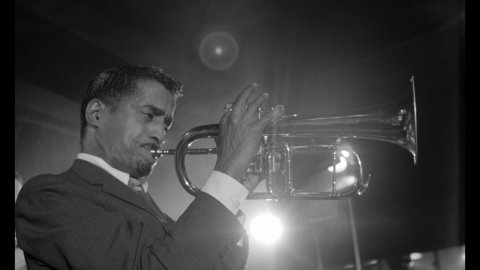
A swinging celebration of Black male talent
Posted on Mon 13 Sept 2021
Cinema Rediscovered 2021 Film Critics workshop participant Malaika Kegode’s take on A Man called Adam’s swinging celebration of talent of Black male.
A Man Called Adam is both a swinging celebration of talent and a clumsy analysis of trauma. Referred to as one of the first American movies to be produced by an African American (Ike Jones), the 1966 drama follows Adam - played with admirable sincerity by Sammy Davis Jr - a talented but troubled cornet player as he charges chaotically through life. A change comes when he meets Claudia - Cicely Tyson, working magic with a troublesome script - a Civil Rights campaigner and granddaughter of famous jazz trumpeter Willie (Louis Armstong). Claudia’s influence pushes Adam to try and be a better man and overcome his self-destruction.
Midway through the film, Adam sits with his protege Vincent (Frank Sintara Jr), talking about the importance of soul when playing jazz, and why Black musicians seem to naturally have more of it.
“The reason why coloured cats have more soul is that they never took time out to take lessons. They either stole a horn, found a horn or someone gave ‘em a horn - and they had to start from scratch. So, they had no other story to tell but what was inside of ‘em - which was their soul.”
This observation is at the heart of the film, which strives to find a connection between Adam’s troubled past and his volatile present, and how it relates to his innate musical skill. A Man Called Adam explores the troubled genius trope by centring the emotional core of the film on a cast of Black actors, showing pain and trauma that leads to tenderness and vulnerability, rarely seen between Black men in Hollywood movies of this era. The men embrace, apologise to, and find solace in each other. Adam’s self-destruction is shown as tied not only to his own actions but to a wider civil unease and the trappings of Black manhood. There are moments of transcendence in the jazz numbers as Adam’s coronet rings out to the integrated club audiences - indicative of a changing world. This sense of progression is disrupted by sudden punches of racism and homophobia that slice through and derail any positive progress Adam makes. This undulating sense of progress and regression mimics the unpredictability of jazz itself.
But while A Man Called Adam tries to humanise its protagonist and present a complex picture of Black masculinity, it ultimately ends up falling into tropes that veer so sharply into melodrama that the intricacies of the characters are lost by its final act. When a tearful Claudia mourns Adam’s lack of reaction to a violent attack on Vincent, she blames herself for taking away Adam’s “manhood”. What follows is a steep downward spiral for Adam, which ultimately suggests that the trauma of Black masculinity is inescapable.
The cast of A Man Called Adam are truly magnetic. Sammy Davis Jr, in particular, usually known for his musical and comic roles, commits fully to creating a rounded, sensitive portrayal. Even as the narrative falters, Sammy Davis Jr and Cicely Tyson give compelling performances worthy of mention in the African American film canon.
Malaika Kegode
Malaika Kegode is a writer, performer and producer. She has appeared on stages at a number of festivals and literary events including WOMAD and Edinburgh Book Festival. She has published two poetry collections with Burning Eye Books, and the playtext of her debut theatre show Outlier is published by Salamander Street. An autobiographical gig-theatre show created with prog-rock band Jakabol, Outlier was the first piece of new writing to appear on Bristol Old Vic’s main stage in 2021. In addition to her own writing, Malaika is a poetry mentor and workshop leader. She is the founder and lead producer of Milk Poetry, an organisation that produces innovative spoken word events in a supportive environment. Outside of poetry, she is passionate about writing on the themes of cinema, culture and race.
Malaika also studies film and has worked as a programme selector for Encounters Film Festival and Tallinn Black Nights. Her debut short poetry-film Wide as the Sea, an exploration of millennial Queer culture, was made over the 2021 lockdown on a £10 budget. It has been shown at various online events, including Queer Vision’s Sofa Club. She is excited to continue exploring genre, form and the power of the written word made visual.
Follow Malaika on Twitter: @MalaikaKegode and Instagram: @mal.keg
